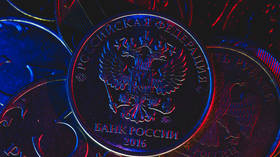EU to ‘paralyze’ assets of Russian Central Bank

The EU is planning to freeze the assets of Russia’s Central Bank, European Commission head Ursula von der Leyen said on Saturday, announcing a new round of sanctions against Moscow amid the ongoing military operation in Ukraine.
“We will paralyze the assets of Russia’s Central Bank. This will freeze its transactions. It will make it impossible for the Central Bank to liquidate assets,” she tweeted.
The head of the EC will offer the measure along with a number of other restrictions on Russia for consideration to the leaders of EU countries. According to the official, all measures are created by the EU in coordination with the US, UK, and Canada. In a joint statement, the allies said they “commit to imposing restrictive measures that will prevent the Russian Central Bank from deploying its international reserves in ways that undermine the impact of our sanctions.”
The sanctions against the Russian Central Bank could target its international reserves, amounting to around $643.2 billion as of February 18. Reserves surged $3.6 billion in the previous week, but the data is released with a one-week delay, and it is hard to tell for now how the military operation in Ukraine affected the volume.
Second, we will paralyse the assets of Russia’s central bank. This will freeze its transactions. And it will make it impossible for the Central Bank to liquidate its assets. pic.twitter.com/8H9eWkNCW9
— Ursula von der Leyen (@vonderleyen) February 26, 2022
Commenting on the EU’s announcement, a senior White House representative said Washington expects the ruble to “run into a freefall” after it loses the support of the Central Bank. Speaking on condition of anonymity, he said, however, that the Central Bank sanctions are still in the works and it is hard to tell what the final version will look like.
“We’re still finalizing this specific execution modality for the Central Bank sanctions. And it could involve both the flows that the Russian Central Bank is allowed to undertake, as well as the assets they have,” the representative said, as cited by TASS.
In recent years, the Russian government and Central Bank have been gradually reducing the country’s exposure to the US dollar, reshaping its international holdings in favor of other currencies and gold. International rating agencies have previously said that Russia’s financial reserves would allow the country to cope with the negative effects of sanctions, if or when they come.
On Saturday, the EU also vowed to “remove selected Russian banks” from the SWIFT international system of interbank transfers, which would effectively block their ability to conduct transactions internationally. Earlier, Brussels blocked access to EU loans for the Russian government and the Central Bank.
Western states agreed to introduce “massive” sanctions on Russia earlier this week after Moscow launched a “special military operation” in Donbass at the request of the region’s recently recognized Donetsk (DPR) and Lugansk (LPR) People’s Republics, vowing to “demilitarize” Ukraine and defend the people against “aggression” by Kiev. The majority of Western nations see Russia’s move as an “unprovoked” and “unjustified” attack.
For more stories on economy & finance visit RT's business section













